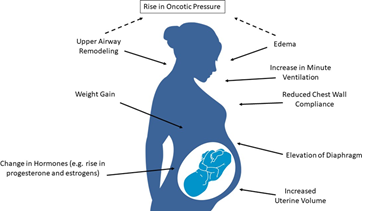Obstructive Sleep Apnea in Pregnancy

Obstructive Sleep Apnea During Pregnancy: Key Insights
Read Time: 4 mins
During pregnancy, respiratory patterns during sleep may change, with some women experiencing symptoms such as snoring and even pauses in breathing—this condition is known as obstructive sleep apnea (OSA). Understanding the potential risks and available treatments for sleep apnea in pregnancy is crucial for ensuring the health of both the mother and the baby.
What is Obstructive Sleep Apnea During Pregnancy?
Obstructive sleep apnea occurs when there are pauses in breathing during sleep, lasting at least 10 seconds, and accompanied by drops in oxygen levels. This can cause frequent awakenings, disrupting the quality of sleep and leading to several health concerns. While OSA in pregnancy is relatively rare, it can lead to complications if left untreated.
Risk Factors for Sleep Apnea in Pregnancy
Several factors can contribute to the development of sleep apnea during pregnancy. As pregnancy progresses, the airway can become more disturbed, leading to an increased risk of snoring and apnea. Increased progesterone levels help to dilate the airways, but other factors can still trigger sleep apnea.
-
Progesterone’s Protective Role: During pregnancy, high levels of progesterone are beneficial. This hormone helps dilate the airways and makes the body more responsive to changes in carbon dioxide, which helps oxygen flow more efficiently to tissues. However, physical discomfort during late pregnancy can lead to more frequent back sleeping, a position associated with higher apnea risk.
-
Weight and Obesity: Women who are overweight or obese, or who gain significant weight during pregnancy, have a higher risk of developing sleep apnea. Additionally, a larger neck circumference can increase the likelihood of this condition.
-
Other Contributing Factors: Nasal congestion due to hormonal changes and smoking during pregnancy can exacerbate sleep apnea symptoms.
Symptoms of Sleep Apnea in Pregnancy
The symptoms of sleep apnea during pregnancy are similar to those outside of pregnancy and may include:
-
Snoring
-
Breathing pauses or shortness of breath during sleep
-
Waking up with choking, snorting, or gasping
-
Excessive daytime sleepiness
-
Frequent urination at night (nocturia)
Since these symptoms are common during pregnancy, sleep apnea is often underdiagnosed. It is particularly important to consult a sleep specialist after the sixth month of pregnancy when symptoms tend to worsen. High-risk women, such as those with obesity, preeclampsia, gestational diabetes, or intrauterine growth restriction, should be closely monitored.
Treatment for Sleep Apnea During Pregnancy
Managing sleep apnea during pregnancy is essential to prevent complications for both mother and baby. Untreated sleep apnea can lead to conditions such as gestational hypertension, diabetes, and complications during labor, including fetal growth restriction.
-
Sleep Positioning: It is recommended that pregnant women sleep on their sides rather than their backs, which can reduce the risk of apnea events.
-
Continuous Positive Airway Pressure (CPAP): The gold standard treatment for sleep apnea is CPAP therapy, which helps keep the airways open during sleep. For severe cases, or in the case of multiple pregnancies or obesity, bilevel therapy may be recommended.
-
Adjusting Therapy During Pregnancy: As pregnancy progresses and weight increases, CPAP pressure settings may need to be adjusted. In rare cases, additional oxygen or even a surgical procedure, such as a tracheostomy, may be required.
When to Seek Medical Advice
If you experience symptoms such as loud snoring, gasping, or excessive daytime fatigue, it is important to contact your healthcare provider. They can recommend an overnight sleep study (polysomnography) to evaluate your condition and determine the best course of action for treatment.
Expert Tips
-
Pay attention to any changes in your sleep patterns, especially if you notice increased snoring or waking up gasping for air.
-
Talk to your doctor about sleep apnea if you have any of the risk factors like obesity or a history of preeclampsia.
Key Takeaways
-
Sleep apnea in pregnancy is uncommon but can have serious implications if left untreated.
-
Factors like weight gain, obesity, and back sleeping can increase the risk of developing sleep apnea.
-
CPAP therapy is the most effective treatment, and adjusting the settings as your pregnancy progresses is essential.
-
Always consult your doctor if you notice symptoms or if you have high-risk conditions such as gestational diabetes.
If you believe you may be experiencing sleep apnea symptoms, seek medical advice to explore the best treatment options for your pregnancy.




